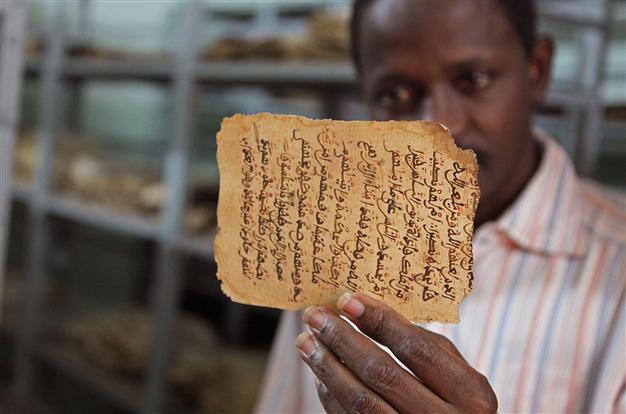Saved Mali manuscripts face damage in new home
BAMAKO - The Associated Press

A man holds a page from an ancient manuscript that will need to be restored after being damaged in Bamako, Mali, Tuesday, Jan. 27, 2015. AP Photo
After being spirited away from under the noses of rampaging Islamic extremists, thousands of ancient manuscripts from the fabled city of Timbuktu now face another threat: weather and poor storage conditions in their new location that scholars say could cause permanent damage.In 2012, Timbuktu and the rest of northern Mali fell under the control of Islamic extremists following a military coup. The turbaned fighters made women hide their faces, forbade the music for which Mali is known and deemed religious buildings and artifacts to be idolatrous.
They took aim at the manuscripts that date back to the 13th century. The camel-skin bound manuscripts reflect the diversity of learning that marked Timbuktu's heyday and cover a vast array of subjects, including astronomy, law, history and philosophy.
Before the al Qaida-linked fighters were pushed from Timbuktu by a French military intervention in 2013, they set ablaze the Ahmed Baba Institute of Higher Learning and Islamic Research, where many of the brittle manuscripts were stored, protected from the harsh Sahara Desert climate. UNESCO estimated that about 4,000 of the manuscripts were destroyed.
But most of the documents had been saved thanks to the library's custodians, who had spirited them out of the occupied city in rice sacks, on donkey carts, by motorcycle, by boat and by four-wheel-drive vehicles.
The Ahmed Baba Institute is currently watching over 27,000 manuscripts in Bamako, Mali's capital in the south. The institute's director says, however, that the different climactic conditions are taking a toll.
"The humidity here, the strong rain, the dust that is not the same kind of dust we know in Timbuktu - this has caused us a lot of problems," Dr. Abdoul Kadri Idrissa Maiga said. "A lot of manuscripts have been damaged."
A three-day UNESCO conference on the future of the manuscripts was started in Bamako on Wednesday.
At first, rainwater was leaking through windows and damaging some of the documents, Maiga said. Though that problem has been fixed, he said humidity causes pages to stick together, and dust and heat are damaging the writing on the pages.
The building is not air-conditioned, though Lazare Eloundou Assomo, UNESCO's representative in Mali, said the organization had installed dehumidifying equipment and would now work on cleaning the manuscripts and establishing "a system of sanitation" for the rooms where they are being held.
"We are going to continue to train personnel in conservation techniques and digitization. We are also working on returning the manuscripts to Timbuktu," Assomo said.
The country's U.N. peacekeeping mission has already invested around $35,000 for the restoration of three libraries in Timbuktu to house the manuscripts, said Sophie Ravier, the head of the culture and environment unit of the U.N. here.
But they might have to remain in the capital for some time, even after homes for them are built to house them in the fabled city of Timbuktu. Al-Qaida in the Islamic Maghreb, known as AQIM, is re-asserting its presence in the region, staging a growing number of attacks in recent months.
















